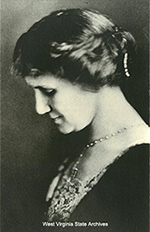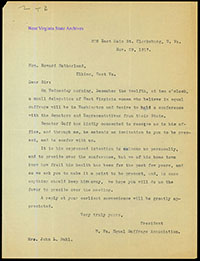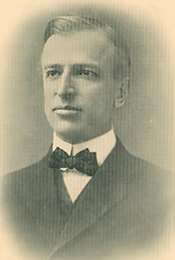
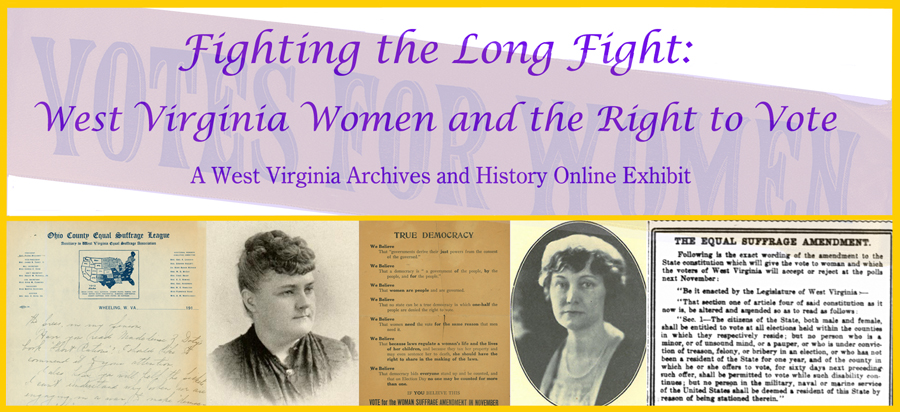
Chapter Five |
|
"Have you observed how the suffragists of West Virginia are giving their time to patriotic war service? And they are not making this service a matter of bargain. They love their country, they believe in democracy, they serve because every impulse in them demands that they serve. At the same time they see that this country has a government not wholly true to its principles. We will not cease to ask for the ballot." - Lenna Lowe Yost, Fairmont West Virginian, November 20, 1917 |
When the WVESA met in November 1917, the women adopted resolutions that reflected not only the continued goal for woman suffrage but also committed themselves to helping the country win the war. At the convention, Lenna Lowe Yost declined to serve again as president, and Julia Walker Ruhl of Clarksburg was elected as president "as a forlorn hope" after the 1916 defeat, she later recalled. Also elected were Jessie List Hazlett of Wheeling, first vice president; Cora/Cara Ebert of Parkersburg, second vice president; Nancy Mann of Huntington, third vice president; Daisy Peadro of Parkersburg, recording secretary; Dr. Harriet B. Jones of Glen Dale, corresponding secretary; and Harriet Schroeder of Grafton, treasurer. However, with their work for the war effort, many of West Virginia's suffragists were not able to accept chairmanships or offices within local or state suffrage organizations. | 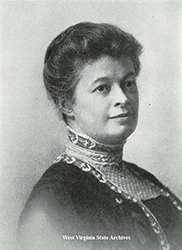 Julia Ruhl, The Silver Gleam, Sc2014-019, West Virginia State Archives |
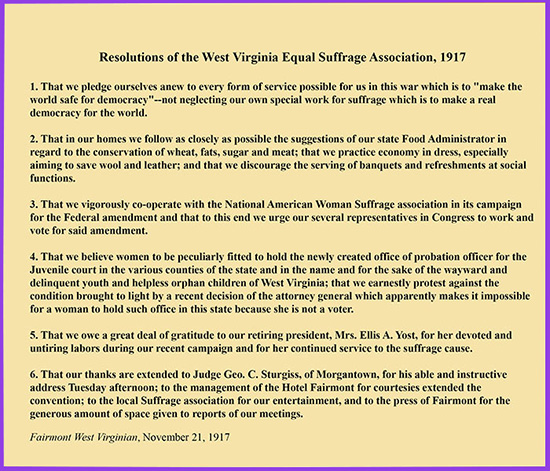
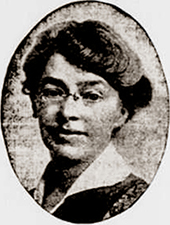 Florence Hoge, Wheeling Intelligencer, May 1, 1916 |
While the NAWSA and the WVESA came out in support of the war effort, there were other suffragists who took a different course Beginning in January 1917 and continuing for the next two years, the militant National Woman's Party picketted outside the White House in support of woman suffrage. Their picketting was criticized after the United States entered the war in April, and beginning in June many were arrested, imprisoned, force fed, and beaten. Given the conservatism of many West Virginians, it is unlikely that the National Woman's Party found many adherents among West Virginia women, although the party did enlist some supporters. The Ohio County Equal Suffrage League made its disapproval clear in information sent to the local newspaper in June. In September, the league reiterated their position at a time when representatives of the National Woman's Party were in Wheeling. One league member, former president Florence Hoge, reacted differently. Not only did she support the women picketers, she tried to obtain help for them from U.S. Senator Howard Sutherland in the early Fall. Finally, in October, she resigned from the "older and more conservative organization" and became chairman of the National Woman's Party in West Virginia. | 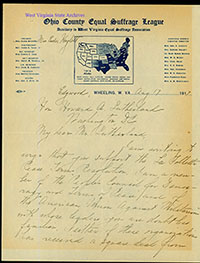 Correspondence between Florence Hoge and Sen. Howard Sutherland, Sutherland Collection, West Virginia State Archives |
|
"If for no other reason I earnestly hope that because of the quick, loyal, and faithful service of the women in answer to their country's call you will do all in your power to report favorably on the Federal suffrage amendment." - Elizabeth I Cummins of Wheeling, Extending the Right of Suffrage to Women |
The U.S. House of Representatives had formed a Committee on Woman Suffrage a few months earlier. The committee met early in January 1918 and heard testimony from such witnesses as Carrie Chapman Catt, Anna Howard Shaw, representatives of the National Woman's Party, those opposed to woman suffrage, and others. The committee received telegrams from men and women around the country urging passage of a federal suffrage amendment, among them messages from West Virginians in Wheeling, Parkersburg, Morgantown, Huntington, and elsewhere in the state. A group of more than one hundred women from the Huntington area sent a telegram to committee chair John E. Raker: "With all the strength of our voteless might and a firm belief in the views expressed by President Wilson to the French people concerning right of expression of those who are governed we urge you to favorably report woman suffrage." (Extending the Right of Suffrage to Women, 315) On January 8, the committee made such a report; on the 9th, President Woodrow Wilson came out in support of the federal amendment; and on the 10th, the House of Representatives narrowly passed the bill by the required two-thirds margin. Of West Virginia's delegation, Congressmen Matthew Neely, Harry Woodyard, George Bowers, and Adam Littlepage voted for the amendment. Edward Cooper and Stuart Reed, neither of whom was present, were paired, Cooper against and Reed for passage. After postponing a vote several times, the Senate finally voted on the woman suffrage amendment on October 1 but failed to pass it by the necessary majority. The Senate again failed to pass the amendment in February 1919. |
The WVESA met in Charleston in early April. NAWSA president Carrie Chapman Catt, NAWSA secretary Mrs. Frank Shuler, and U.S. Congressman Matthew M. Neely made appearances at the convention. Catt predicted that women would "move out of the House of Prejudice and into the House of Freedom" within two years. In his remarks, Neely called on "God [to] give one or two wicked United States senators a little more brain so that the American women may have what they justly deserve--the vote." (Charleston Gazette, April 4, 1919)
| With a new Congress taking office in March 1919, the House of Representatives again voted in favor of the woman suffrage in May, and the Senate finally approved the Susan B. Anthony Amendment on June 4, 1919. West Virginia's entire congressional delegation (Congressmen Bowers, Neely, Woodyard, Reed, Leonard Echols, and Wells Goodykoontz; Senators Sutherland and Davis Elkins) voted for the amendment. Henrietta Arbenz Romine of Wheeling, a member of the state suffrage executive committee, said of the victory:
All suffragists of West Virginia have every cause to rejoice over the good news, not only from the standpoint of the wonderful victory women have gained after a long and at times bitter struggle, but because we had a 100 per cent standing in congress, every one of six congressmen and our two senators standing absolutely pat for suffrage. The solid south, eleven states, is conceded against equal suffrage, so West Virginia has the great distinction of being the pivotal state to secure the necessary thirty-six for ratification. (Wheeling Intelligencer, June 5, 1919) | 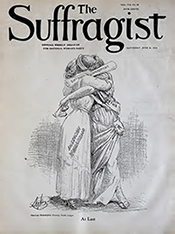 Cover of The Suffragist, June 21, 1919. Publication of the Congressional Union for Woman Suffrage. https://archive.org/details/thesuffragist |
Primary Documents:
Letter from Ohio County Equal Suffrage League Regarding Pickets in Washington, 1917Statement on Pickets in Washington, 1917
Select Letters and Telegrams from West Virginia, 1918

